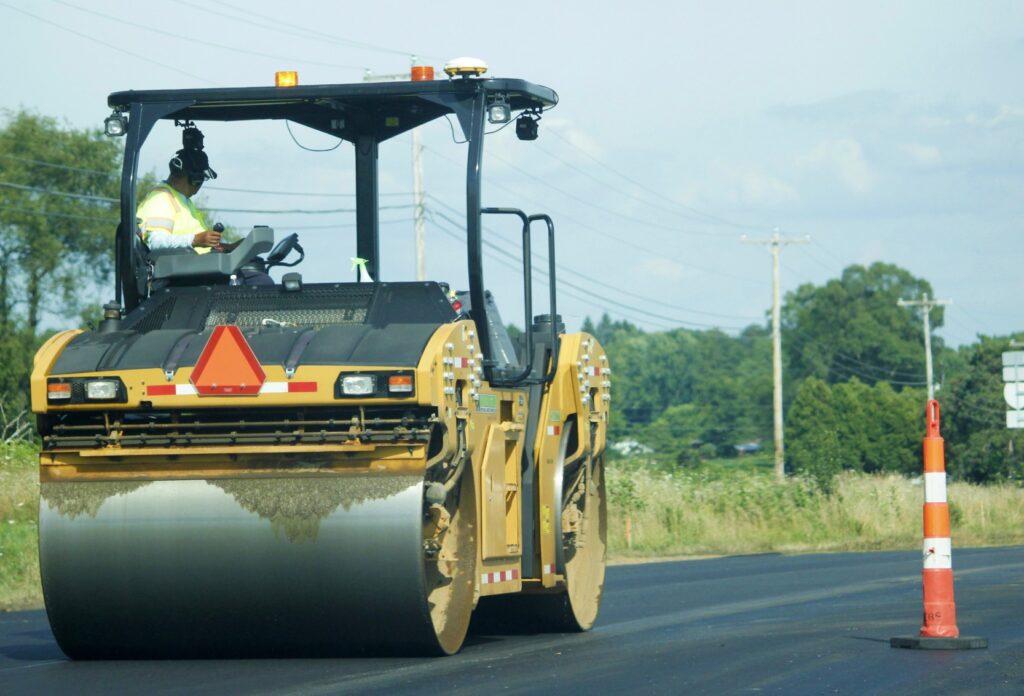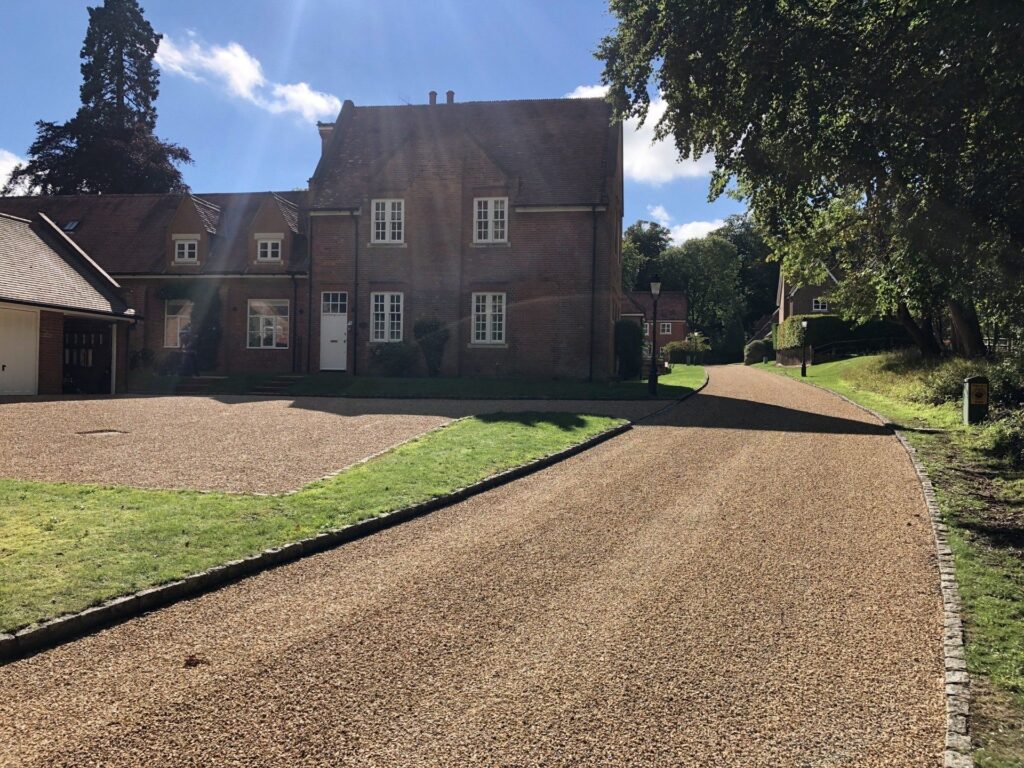Even the best-kept driveway will degrade over time from use and harsh weather.
When that happens, you have two main options for bringing it back to excellent condition: resurface what you’ve got or replace it outright.
Each option has its own benefits and drawbacks, especially in terms of cost, time investment, customisation and lifespan. So join us as we explore resurfacing and replacement to help you figure out which is best for your driveway.
The heavy weight of vehicles and freeze-thaw cycles of changing temperatures will eventually cause cracks to form in your driveway surface.
If the cracks are small and you’ve got a knack for DIY, you can generally repair your driveway yourself. But when the cracks grow too wide or too deep, simple repairs won’t cut it. That means it’s time to call a local driveway surfacing contractor.
If only the surface is damaged, resurfacing will allow you to restore your driveway without digging up the foundations. This is cheaper and takes less time, though won’t necessarily give you the greatest possible driveway lifespan.
On the other hand, if the damage has spread to the foundations, or if your driveway is over 20 years old, no amount of surface repairs will lead to long-term stability. Instead, you’ll need to replace the entire surface. This is more expensive and time consuming, but ensures a high-quality driveway that can last an exceptionally long time with proper care.
When a driveway needs resurfacing or replacement, homeowners and business owners throughout Oxfordshire, Berkshire, and Reading turn to Hazell & Jefferies Ltd. We have over 50 years’ experience delivering first-rate surfaces in a wide variety of materials to enhance the style and aesthetic of your property.
Contact us today to install a strong, beautiful and long-lasting driveway that boosts curb appeal and increases property value.
Resurfacing is the midpoint between minor repairs and a complete overhaul.
By covering your existing driveway with a new layer of material, you can protect it from further wear and tear, and make it look brand new.
This is especially useful if you’re planning to sell your property in the next 10 years, as the lower cost and added value help you get the greatest possible return on your investment.
When you contact Hazell & Jefferies Ltd for driveway resurfacing, we begin by thoroughly washing the existing surface. This removes dirt, debris, algae and weeds, all of which could otherwise prevent the new material from sticking properly. We also use a specialised cleaner to remove oil and grease stains, as these could cause your new surface to degrade prematurely.
Next, we fill in cracks with sealant and repair potholes with filler, if they exist. This creates a smooth, even base for the new surface to rest upon.
Once your driveway has been cleaned and repaired, our fully qualified team will lay the new material. This can be the same as your original driveway material, or you can lay something new. Popular resurfacing materials include asphalt and concrete.
After applying the new material, we carefully spread and smooth it with specialist equipment. This ensures an even, uniform finish with no bumps or uneven spots.
Your driveway will then be left to dry and cure for an appropriate amount of time. Depending on your chosen driveway surfacing material, this could be anywhere between 24 hours and seven days. During this time, you’ll need to keep your driveway free from foot and vehicle traffic.
When your freshly resurfaced driveway has cured, it’ll be ready for you to use.
Driveway resurfacing requires a stable base to work from. So for it to be effective, your current driveway can’t be crumbling or have severe cracks.
It also requires a solid earth base under the sub-base. And the soil under and around your driveway must be free draining to prevent soil movement. An unstable earth base could cause cracks in the upper surface, ruining your driveway’s appearance and drastically reducing its lifespan.
The extra surface can affect the height of your driveway, too. So the step between your driveway and the road will also need to be considered.
However, if you have a decent base, earth base and sub-base infrastructure to work from, resurfacing is an excellent way to breathe new life into your driveway. It’s almost always cheaper, quicker and easier than full replacement, giving you a beautiful driveway with the least amount of cost and disruption.
In contrast to resurfacing, driveway replacement involves completely removing your existing driveway and installing a new one from scratch.
This is generally the best option for a severely damaged driveway with many cracks and potholes, or one with a damaged base. But it’s also recommended for any driveway that’s more than 20 years old.
That’s because older driveways generally weren’t constructed using rebar reinforcement, or were made with a sub-base that used little or no aggregate to improve drainage. As such, they’re a lot more prone to cracks, and would continue to be so even after resurfacing.
Our team starts by removing your old driveway material and hauling it away. Once it’s gone, we then even out the earth surface underneath, adding more soil if needed.
At this stage, we can also reshape the ground to create a new layout for your driveway. This gives you much greater control over the final appearance.
Depending on your chosen driveway material, we might also add a layer of asphalt, sand or other aggregate to improve drainage.
To create a solid base for your new driveway, we start by creating tie-ins to adjoining surfaces to prevent horizontal slide, and insert control joints to reduce the risk of cracking. We then tie together a mat of rebar for internal structure and support. This might involve placing rebar ‘chairs’ above ground to support the base rebar while the new surfacing material is poured.
When all the stability infrastructure is in place, we pour and smooth the new materials before leaving it to cure, just as we would with driveway resurfacing.
Replacing a driveway is more expensive and takes longer than resurfacing it. But thanks to the extra preparation in the ground and base, you can expect it to last significantly longer. A replacement driveway will also look far more appealing than a resurfaced one, adding further value to your property.
This process also gives you a chance to reshape the earth base underneath your driveway. That means you can reposition it or tie in other landscaping works to enhance your entire property.
The main factor in deciding whether to resurface or replace your driveway is the extent of the wear.
If the damage to your current driveway is superficial, a simple resurface should do the trick. This is cheaper and takes less time to complete. You can add a layer of matching material or take the opportunity to change the material and style to give your property a new look.
On the other hand, if your driveway is severely damaged or more than 20 years old, replacement is the way to go. It might be more expensive and take longer, but it ensures your driveway will be much more resistant to cracks and potholes in the future. You can also tie in resurfacing with other landscaping works to make extensive changes to your property.
Whichever option you choose, restoring and upgrading your driveway is an excellent way to increase curb appeal, get more enjoyment from your property and add extra value to the sale price. This is especially true when you choose a trusted local driveway surfacing contractor like Hazell & Jefferies Ltd to carry out the works.
Once you’ve decided whether to resurface or replace your driveway, you’ll need to pick out your preferred material. Popular options include:
Homeowners and business owners throughout Oxfordshire, Berkshire, Reading and the surrounding areas rely on Hazell & Jefferies Ltd to lay durable, attractive driveways.
Our fully accredited team works quickly and to the highest standards to minimise disruptions. And we can provide your choice of stunning driveway materials, including tarmac, concrete, asphalt and resin.
Get in touch today to discuss your driveway surfacing needs and we’ll help you decide whether resurfacing, replacement or even simple repairs are right for you.

